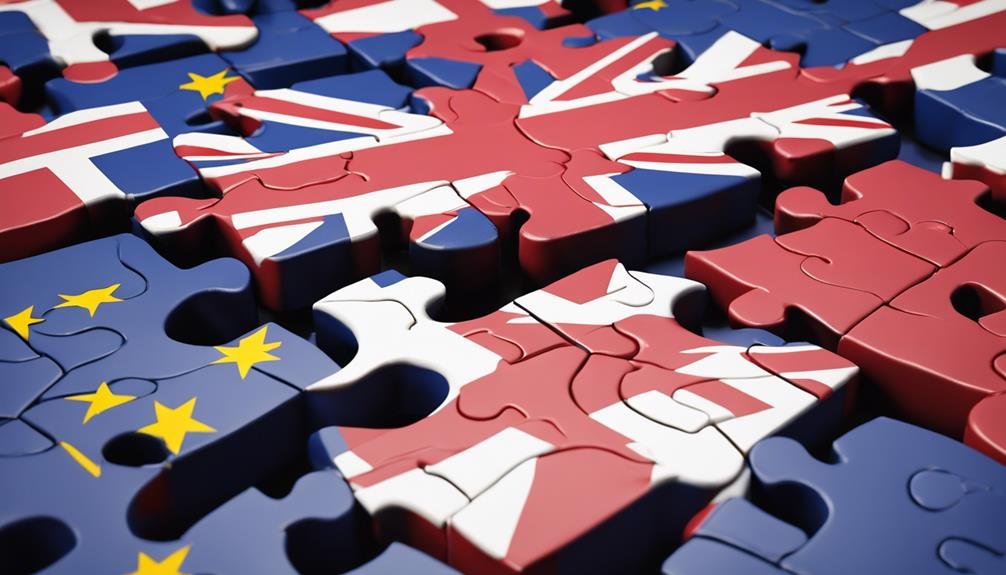Brexit Meaning and Impact: The Truth About the U.K. Leaving the EU
The UK's departure from the EU, or Brexit, presents a complex blend of challenges. It started with a 2016 referendum, reflecting concerns involving sovereignty, immigration, and trade. Major repercussions include the resignation of Prime Minister David Cameron and deep societal divisions. The impact spans trade disruptions, requiring significant adjustments such as new customs procedures. Economically, uncertainties persist with fluctuations, while politically, the UK sees new alignments favoring the Conservative Party. Socially, Brexit intensifies divisions and impacts cultural interactions. The ramifications of Brexit are far-reaching and continuously evolving, shaping the future of the UK and the EU.
Key Takeaways
- Brexit marked the UK's exit from the EU after a referendum in June 2016.
- Trade disruptions required adjustments in supply chains and customs procedures.
- Brexit led to economic uncertainties and reshaped the UK's political landscape.
- Socially, Brexit increased divisions and impacted cultural exchanges.
- The long-term implications of Brexit disruptions remain uncertain.
Brexit Origins and Timeline
Brexit, marked by the UK's decision to depart from the European Union, was initiated through a referendum in June 2016, setting off a prolonged period of negotiations and political upheaval.
The origins analysis of Brexit reveals a complex blend of factors, including concerns over sovereignty, immigration, and trade regulations.
The aftermath of the referendum saw a deeply divided UK, with significant implications for its political landscape.
The vote to leave the EU not only led to the resignation of then-Prime Minister David Cameron but also triggered a series of events that culminated in the appointment of Boris Johnson as his successor.
The referendum aftermath highlighted the deep-seated divisions within British society and set the stage for the turbulent negotiations that followed.
Trade Disruptions and Adjustments
The disruptions in trade following the UK's departure from the EU have necessitated significant adjustments in supply chains and customs procedures. Supply chain challenges have arisen due to the new trade barriers, impacting the flow of goods between the UK and the EU.
Customs regulations have become more important, requiring businesses to navigate complex procedures to make sure smooth cross-border trade. Companies have had to adapt quickly to comply with these new regulations, leading to increased administrative burdens and potential delays in shipments.
The need for realignment of logistics processes has become essential to maintain efficient trade operations. As businesses continue to grapple with these changes, the long-term implications of these trade disruptions and adjustments remain to be fully realized.
Economic, Political, and Social Fallout
After the trade disruptions and adjustments post-Brexit, the economic, political, and social aftermath has revealed a complex web of challenges and transformations in the UK and beyond.
Economic uncertainties have plagued the UK, with fluctuations in the economy, businesses facing unprecedented challenges, and the financial services sector grappling with new regulations. The Pound Sterling's value has been volatile, reflecting the market's uncertainty.
Politically, Brexit has reshaped the UK's landscape, propelling the Conservative Party to power and reigniting debates on Scottish independence. The Northern Ireland protocol has created tensions, testing the unity of the EU.
Socially, Brexit has led to increased social division, with changes in immigration policies affecting EU citizens' rights and a rise in nationalism observed. The younger generations have felt disconnected from the EU, impacting cultural exchanges and collaborations.
Conclusion
In summary, Brexit has undeniably brought about significant changes and challenges for the UK in trade, economics, politics, and society.
While some may argue that the process has been tumultuous and disruptive, it's essential to acknowledge that Brexit has also opened up opportunities for the UK to redefine its relationships and shape its future independently.
Embracing change and adaptation will be vital in navigating the complexities and uncertainties that lie ahead.







